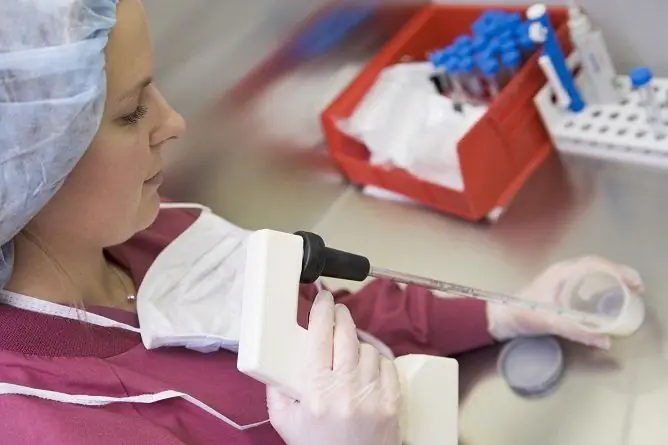- Author Rachel Wainwright [email protected].
- Public 2024-01-15 19:51.
- Last modified 2025-11-02 20:14.
Tests for hormones in women
The content of the article:
- When it becomes necessary to test hormones in women
-
What hormones to donate to determine the hormonal imbalance in a woman
- Where hormones are synthesized
- List of major hormones
-
The menstrual cycle and its regulation
- Menstrual cycle
- Cycle regulation
-
Basic rules for taking tests
- Preparation for the examination
- Examination terms
- Examination of pregnant women
-
Interpretation of test results
- Range of norm
- Deviations from the norm
- Video
The normal functioning of all body systems largely depends on the work of the endocrine glands, therefore, the need for hormone tests in women may arise not only in case of problems with the menstrual cycle, carrying pregnancy and conception. The list of indications for hormonal examination is extensive and is not limited to determining the level of female sex hormones.

To determine a woman's hormonal imbalance and its cause, it is necessary to study the level of hormones in the blood.
When it becomes necessary to test hormones in women
Doctors recommend a study of the concentration of hormones in women for many diseases and pathological conditions:
- menstrual irregularities;
- infertility;
- miscarriage;
- complicated pregnancy;
- sexual disorders;
- puberty disorders;
- pathological course of menopause;
- premenstrual syndrome;
- benign and malignant neoplasms of the uterus and appendages;
- endocrine diseases and syndromes;
- breast pathology;
- dermatological problems.
Not only the presence of complaints requires a study of the hormonal background. In case of physiologically proceeding pregnancy, it is recommended to determine hormonal markers to calculate the risk of having children with congenital malformations. A preventive examination helps to predict and prevent a number of diseases.
What hormones to donate to determine the hormonal imbalance in a woman
At any age, the functioning of the female body depends on the well-coordinated work of all endocrine glands.
Where hormones are synthesized
To diagnose endocrine disorders, hormones are studied:
- ovaries;
- pituitary gland;
- hypothalamus;
- thyroid gland;
- parathyroid glands;
- adrenal glands;
- pancreas.
The scope of the examination depends on the clinical manifestations and is determined by the specialized specialist.
List of major hormones
List of studied hormones:
| The name of the hormone | Place of synthesis | Functions |
| Follicle-stimulating (FSH) | Anterior pituitary gland | Accelerates the development of follicles in the ovaries and the formation of estrogen |
| Luteinizing (LH) | Anterior pituitary gland | Stimulates the secretion of estrogen by the ovaries, triggers ovulation and the formation of the corpus luteum |
| Prolactin | Anterior pituitary gland | Causes and supports the formation of milk in the mammary glands, inhibits the ovulation cycle |
| Estradiol | Ovarian follicular apparatus, adrenal cortex | Regulates the formation and functioning of the genital organs, is responsible for the development of secondary sexual characteristics, participates in water-salt, protein and lipid metabolism, affects blood clotting, bone and muscle tissue metabolism |
| Progesterone | Corpus luteum, placenta during pregnancy, adrenal cortex |
Regulates the menstrual cycle, prepares the uterine lining for embryo implantation, ensures the growth and bearing of the fetus |
| Testosterone (male sex hormone) | Ovaries, adrenal cortex | Participates in the reverse development of follicles in the ovaries, affects the hormonal activity of the pituitary gland |
| Thyroid-stimulating (TSH) | Anterior pituitary gland | Controls the development of the thyroid gland, stimulates the production of thyroid hormones |
| Triiodothyronine (T3) | Thyroid | Affects the growth and development of the body, metabolism, heart rate, participates in thermoregulation |
| Thyroxine (T4) | Thyroid | Activates metabolic processes |
| Calcitonin | Thyroid | Reduces blood calcium |
| Adrenocorticotropic (ACTH) | Anterior pituitary gland | Controls the synthesis and secretion of hormones of the adrenal cortex |
| Cortisol | Adrenal cortex | Regulates carbohydrate metabolism, participates in the development of stress reactions |
| Dehydroepiandrosterone sulfate (DHEA-S) | Adrenal cortex | Acts on androgen receptors, converts to estrogens |
| Growth hormone (STH) | Anterior pituitary gland | Responsible for the growth of the body, participates in lipid, protein, carbohydrate and mineral metabolism |
For the diagnosis and treatment of pathology of the female reproductive system, it is necessary to study the concentration of many hormones. The large number of prescriptions often causes misunderstanding among patients. The idea of the neurohumoral regulation of the menstrual cycle will help not to doubt their validity.
The menstrual cycle and its regulation
For a correct examination, you must have an idea of the cyclical changes in the function of the reproductive system.
Menstrual cycle
The interval between menstrual bleeding is called the menstrual cycle. The countdown is carried out from the first day of the previous to the first day of subsequent menstruation. Normally, it is from 21 to 35 days, about half of women have a 28-day cycle.
In the first half of the cycle (follicular phase), the follicle that synthesizes estradiol matures. With the coordinated work of all regulatory systems, ovulation occurs in the middle of the cycle. In place of the follicle, a corpus luteum (luteal phase) is formed, which synthesizes progesterone. If there is no fusion of the egg with the sperm, then the corpus luteum undergoes a reverse development, which leads to the onset of menstruation.
Cycle regulation
Normal menstrual function is possible with the coordinated work of all links of the complex regulatory system, which includes:
- cortex;
- subcortical region - hypothalamus;
- cerebral appendage - pituitary gland;
- sex gland - ovary;
- target organs - uterus, vagina, mammary glands.
Each level is governed by overlying structures. Target organs are the site of application of hormones produced in the ovaries. The work of the latter depends on hormones synthesized by the anterior pituitary gland. Its functioning, in turn, is determined by the hormones of the hypothalamus. And all these structures are under the control of the cerebral cortex. It is quite difficult to identify at what stages the failure occurred. Hormonal research helps in solving the problem.
Basic rules for taking tests
For laboratory diagnosis, a blood sample from the patient's ulnar vein is required. The fence must be carried out in compliance with the rules.
Preparation for the examination
No special preliminary preparation is required. There are standard requirements for all types of laboratory diagnostics:
- Blood sampling is carried out in a certified laboratory.
- Blood is donated on an empty stomach (a break in eating for at least 8 hours).
- The consumption of alcoholic beverages is excluded (at least 12 hours in advance).
- It is recommended to refrain from smoking (at least 1-2 hours).
The delivery of samples should not be preceded by X-rays, UHF, electrophoresis, massage. If a woman takes any medications during the examination, then it is advisable to refuse them before taking blood. If it is impossible to stop using them, you should inform your doctor about taking the drugs.
Examination terms
The correct result can be expected only if the analysis is carried out taking into account the phase of the menstrual cycle. In the period from 3 to 5 days, the level of most sex hormones is determined:
- luteinizing;
- follicle-stimulating;
- prolactin;
- estradiol;
- testosterone.
The concentration of progesterone, given that its production is carried out in the second phase of the cycle, is determined at 20-22 days. Often the study is carried out twice: the initial value is determined on the 4-5th day, the peak - from the 20th to the 22nd day. Thyroid and adrenal hormonal function can be tested at any time, but blood sampling is usually done in the early days of the menstrual cycle. If menstruation is absent for a long time (amenorrhea), then a study to determine the existing hormonal background is carried out without waiting for their appearance.

Tests for hormones can be prescribed on strictly defined days of the menstrual cycle - this increases their information content
When diagnosing and treating infertility, tests can be prescribed several times: at the beginning of the cycle, during the period of expected ovulation and in the second phase. In dynamics, a laboratory examination is also carried out when carrying a fetus. The specialist sets the time frame for the patient. An individual approach allows you to find out the cause of the imbalance, even in the most difficult cases.
Examination of pregnant women
What tests should be taken for hormones for pregnant women, and is it necessary at all? Determination of the concentration of hormones is carried out repeatedly if pregnancy is complicated by the threat of termination or as a result of assisted reproductive technologies. The main studied hormones: the free subunit of human chorionic gonadotropin (β-hCG), progesterone, total and free testosterone, DHEA-S.
Pregnant women undergo complex screening studies, combined with ultrasound, twice (11-14 and 16-20 weeks). For the first time, the level of β-hCG and specific protein PAPP-A is determined, the second time, the level of β-hCG, free estriol and alpha-fetoprotein protein is studied.
The levels of hormonal markers are taken into account as independent values and as factors influencing the calculation of the individual risk of having children with chromosomal disorders. The concentration of β-hCG decreases in Edwards syndrome, threatened abortion, non-developing and ectopic pregnancy. It increases with Down syndrome, multiple pregnancies and cystic drift. But these are general conclusions. The doctor deciphers the analyzes, although the patient should still have an idea of the norm.
Interpretation of test results
To interpret the test results, it is necessary to know the normal values of the indicators.
Range of norm
In different laboratories, the given limits for the values of individual hormones may differ slightly. It depends on the technique used to obtain the results and the units of measurement.
| Name | Cycle phase | Norm | unit of measurement |
| FSH | follicular | 3.5-12.5 | mIU / ml |
| ovulatory | 4.7-21.5 | mIU / ml | |
| luteal | 1.7-7.7 | mIU / ml | |
| LH | follicular | 2.4-12.6 | mIU / ml |
| ovulatory | 14.0-95.6 | mIU / ml | |
| luteal | 1.0-11.4 | mIU / ml | |
| Estradiol | follicular | 12.5-166.0 | pg / ml |
| ovulatory | 85.8-498.0 | pg / ml | |
| luteal | 43.8-211.0 | pg / ml | |
| Progesterone | follicular | 0.6-4.7 | nmol / ml |
| ovulatory | 2.4-9.4 | nmol / ml | |
| luteal | 5.3-86.0 | nmol / ml | |
| Prolactin | 102.0-496.0 | μIU / ml | |
| TSH | 0.23-3.4 | μIU / ml | |
| T3 free | 3.9-6.7 | pmol / l | |
| T4 free | 10.0-23.2 | pmol / l | |
| Free testosterone | <4.1 | pg / ml | |
| DHEA-S | 4.2-11.0 | μmol / l | |
| Cortisol | 171.0-536.0 | nmol / l |
The indicators are assessed in a comprehensive manner, taking into account the clinical symptoms and the history of the development of the disease. Deviation of values in one direction or another cannot serve as the only basis for a diagnosis.
Deviations from the norm
The reasons for the growth and decrease in hormone levels can be both congenital and acquired.
| Name | Level up | Decrease in level |
| FSH | Primary gonadal insufficiency, the onset of menopause, pituitary tumors | Insufficiency of the gonads of a secondary nature, insufficient function of the hypothalamus, taking combined oral contraceptives |
| LH | Primary ovarian dysfunction | Dysfunction of the pituitary gland, hypothalamus, secondary ovarian hypofunction, intake of significant doses of progesterone and estrogens |
| Estradiol | Ovarian tumors, adrenal neoplasms | Underdevelopment of the gonads of a congenital nature, sclerotic processes in the ovaries, radiation exposure, impaired secretion of gonadotropic hormones |
| Prolactin | Pituitary tumors, hypothalamic tumors, Cushing's syndrome, polycystic ovary disease, hypothyroidism, oral contraceptive use | - |
| Testosterone | Obesity, taking hormonal contraceptives, ovarian disease | - |
The imbalance of hormones results in various types of cycle disorders, and the work of many organs suffers. Therefore, in order to maintain health at the proper level, checking the hormonal background is necessary at all stages of a woman's life. However, only a specialist should prescribe and interpret the tests.
Video
We offer for viewing a video on the topic of the article.

Anna Kozlova Medical journalist About the author
Education: Rostov State Medical University, specialty "General Medicine".
Found a mistake in the text? Select it and press Ctrl + Enter.






